

A good week for global governance. Authors: Alan S Alexandroff, University of Toronto, and Yves Tiberghien, UBC For global governance watchers, this was the big week of the year.
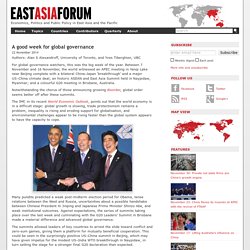
Between 7 November and 16 November, the world witnessed an APEC meeting in Yanqi Lake near Beijing complete with a bilateral China–Japan ‘breakthrough’ and a major US–China climate deal; an historic ASEAN and East Asia Summit held in Naypidaw, Myanmar; and a colourful G20 meeting in Brisbane, Australia. Notwithstanding the chorus of those announcing growing disorder, global order seems better off after these summits. The IMF, in its recent World Economic Outlook, points out that the world economy is in a difficult stage: global growth is slowing, trade protectionism remains a problem, inequality is rising and eroding support for globalisation, and environmental challenges appear to be rising faster than the global system appears to have the capacity to cope.
By contrast, the voices from Europe, Japan, Russia, and India sounded weaker. Xi Jinping's 'Asia for Asians' mantra evokes imperial Japan. Border issues gnaw at stronger India–China trade ties. Authors: Geethanjali Nataraj and Richa Sekhani, Observer Research Foundation.
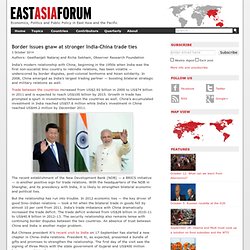
The Shanghai Cooperation Organization (SCO): Rebirth and Regeneration? Members of the Shanghai Cooperation Organization (SCO) like to boast that their organization is special.
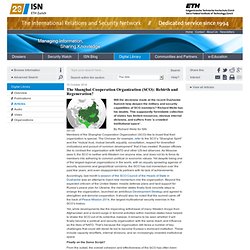
The Chinese, for example, refer to the SCO’s “Shanghai Spirit” and the “mutual trust, mutual benefit, equality, consultation, respect for diversified civilizations and pursuit of common development” that it has created. The Shanghai Cooperation Organization (SCO): Rebirth and Regeneration? ASEAN: Toward a common voice. As the Association of Southeast Asian Nations (ASEAN) and its ten member states join in the establishment of a common economic community in 2015, they must also learn to speak with one voice about matters of geopolitics as well as commerce and trade.

Video Seizing the ASEAN opportunity Stuart Dean, the CEO of GE ASEAN since 2010, explains the company’s approach to the region. Play video. A chance to mend China–Japan relations. Authors: Yves Tiberghien, University of British Columbia, and Yong Wang, Peking University Over the last two years, China–Japan relations have been trapped in a downward spiral.
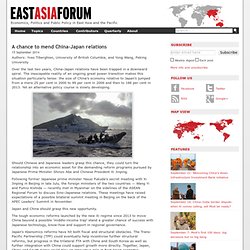
The inescapable reality of an ongoing great power transition makes this situation particularly tense: the size of China’s economy relative to Japan’s jumped from a mere 25 per cent in 2000 to 99 per cent in 2009 and then to 188 per cent in 2013. Yet an alternative policy course is slowly developing. China–India border dispute: when Xi comes calling, will Modi be ready? Author: Sourabh Gupta, Samuels International When President Xi Jinping arrives in the Indian capital next week, he will become the first leader of a major power to pay a state visit in the Narendra Modi era.
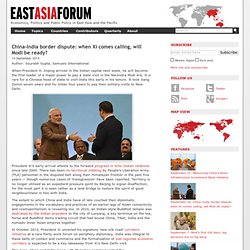
It is rare for a Chinese head of state to visit India this early in his tenure. India draws Japan closer as Modi embraces Abe. Author: Purnendra Jain, University of Adelaide The unprecedented warm hug between India’s new prime minister Narendra Modi and Japanese prime minister Shinzo Abe when they met in Japan’s ancient capital Kyoto sent strong diplomatic signals across the region and beyond.
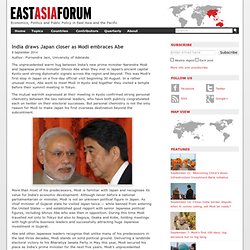
This was Modi’s first stop in Japan on a five-day official visit beginning 30 August. In a rather unusual move, Abe went to meet Modi in Kyoto and together they visited a temple before their summit meeting in Tokyo. The mutual warmth expressed at their meeting in Kyoto confirmed strong personal chemistry between the two national leaders, who have both publicly congratulated each on twitter on their electoral successes. But personal chemistry is not the only reason for Modi to make Japan his first overseas destination beyond the subcontinent. More than most of his predecessors, Modi is familiar with Japan and recognises its value for India’s economic development. Is bigger better for ASEAN in a mega-regional world? Author: Razeen Sally, NUS Big-block trade agreements or ‘mega-regionals’, revolving around one or more major powers, are the latest trend in trade policy negotiations.
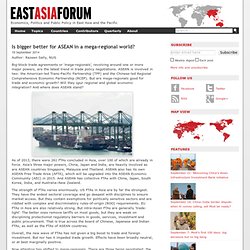
ASEAN is involved in two: the American-led Trans-Pacific Partnership (TPP) and the Chinese-led Regional Comprehensive Economic Partnership (RCEP). But are mega-regionals good for trade and economic growth? Will they spur regional and global economic integration? India and Japan boost cooperation, but no nuclear power deal. Authors: Pravakar Sahoo and Abhirup Bhunia, IEG Modi’s visit to Japan from 31 August to 3 September was dubbed a success.
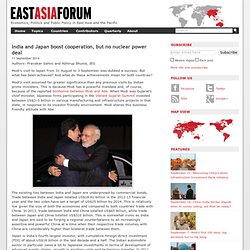
But what has been achieved? India and China must think outside the ‘bureaucratic box’ Author: Tansen Sen, City University of New York Chinese president Xi Jinping’s forthcoming visit to India will achieve nothing unless the new leaders of India and China can overcome existing inertia and seriously start revamping their bilateral relations.
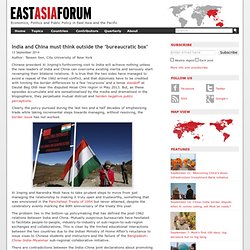
China Creates New ‘Asia for Asians’ Security Forum. China Creates New ‘Asia for Asians’ Security Forum. Why Xi Jinping's visit to India is significant. 16 September 2014Last updated at 12:11 ET By Harsh V Pant King's College, London China is one of India's top trading partners This is an interesting month in India's diplomatic diary. After a successful visit to Japan earlier this month, Prime Minister Narendra Modi will be welcoming Chinese President Xi Jinping on Wednesday.
China woos Maldives to join Maritime Silk Road. China has invited Maldives to actively participate in the Maritime Silk Road (MSR) project, an initiative to string together partnerships with countries in the Asia-Pacific and the Indian Ocean, including India, in the wake of the decision by the United States to bolster its military capability in the region. Visiting President Xi Jinping prefaced his visit by welcoming Male’s intent to get “actively involved in the 21st century Silk Road initiative".
Mr. Why Xi Jinping's visit to India is significant. Delhi gears to join China-Russia club. New Delhi, Aug. 5: India is preparing to join the influential Shanghai Cooperation Organisation (SCO) strategic grouping, currently led by China and Russia, just days ahead of the Prime Minister’s September visit to the US where his bonhomie with Moscow has already triggered unease. The SCO has informed New Delhi that it plans to approve documents making India a full member at a September 11-12 summit in Dushanbe, Tajikistan, senior officials have told The Telegraph. Iran, Pakistan and Mongolia will join India as new members of the grouping, now made up of Russia, China, Kazakhstan, Kyrgyzstan, Uzbekistan and Tajikistan.
America views the SCO as a potential post-Cold War counter-balance to Nato, and Beijing and Moscow have accused Washington of trying to split the grouping. Unlike Nato, the SCO has so far not engaged in military action beyond joint exercises. Shanghai Cooperation Organisation ready to welcome new members. India and Pakistan look set to become members of the Shanghai Cooperation Organisation (SCO) after the existing members expressed willingness to expand the grouping during a meeting of its foreign ministers that was held on July 31 in Dushanbe, Tajikistan. The foreign policy chiefs of Russia, China, Kazakhstan, Kyrgyzstan, Tajikistan and Uzbekistan also discussed the situations concerning Afghanistan and Ukraine, and financing of new investment projects. The situation in Afghanistan causes the greatest alarm to the member states. Russia said it supported the signing of a framework agreement for cooperation on border issues as soon as possible.
According to Sergey Lavrov, this cooperation will focus on the struggle against the infiltration of terrorists and religious extremists into Central Asian countries. SCO To Admit New Members: Iran, India, Pakistan and Mongolia. Draft documents on the procedure of the admission new members to the Shanghai Cooperation Organization have been adopted. This is one of the main outcomes of the meeting of the foreign ministers of Russia, China, Tajikistan, Kazakhstan, Uzbekistan and Kirgizstan held in Dushanbe this weekend. The adoption of these documents at the next SCO summit will give the green light for admitting the four observer-states, India, Pakistan, Iran and Mongolia, to the six-member organization.
Documents will be submitted to the SCO summit for the adoption. The summit will be held in Dushanbe in September. SCO membership precursor to Russia-India-China alliance. India: Drawn To The Shanghai Cooperation Organization. India-Japan Defense Ministers Agree To Expand Strategic Cooperation. India and Japan kicked off 2014 on a positive note by expanding their bilateral defense relationship. India-Japan relations kicked off 2014 on a positive note. On Monday, India and Japan resolved to strengthen their strategic and global partnership, which was formally established in 2006, with the addition of a series of new accords on defense cooperation. Indian Defense Minister A.K. Japan-India Security Cooperation. Japan, China seek to hold summit at APEC in November: media.
Japan’s “Russian Embrace” Faces Awkward Trajectory. Author: J. Berkshire Miller Abstract: Last year marked a notable thaw in Japan-Russia bilateral ties after Japan’s Prime Minister Shinzo Abe prioritized improving relations with Moscow. Abe has reinforced this policy with several summit meetings with Russian President Vladimir Putin and an unprecedented dialogue between foreign and defence ministers. Increased military cooperation between China and India a sign of warming ties. In his first official visit to China, Indian Army Chief General Bikram Singh has called on both countries to be partners in mutual benefits. General Singh, who is also Chair of the Chiefs of Staff Committee of the Indian Armed Forces will be in several high level meetings during his four-day visit.
He says his hoping to further improve ties with the Chinese military during his visit. Japan’s G7 Agenda. Park’s peace initiative gets mixed appraisal. Wading into the rough waters of diplomacy in Northeast Asia, President Park Geun-hye has been pushing for a bold initiative to foster peace and cooperation in a region beset by security rivalries and historical and territorial disputes. Buoyed by South Korea’s enhanced diplomatic stature, the Northeast Asia Peace and Cooperation Initiative has fed hopes for regional trust-building, but also raised questions over its feasibility. Can the status quo last in Asia?
International relations as art, not science. The good news is that Australia is doing just fine in shaping its relations with both China and the United States. The bad news is that things could still go wrong for Australia at any time, notwithstanding how skilled it might be in orchestrating its ties between Beijing and Washington. There’s never any guarantee that the ‘right road’ to regional stability or economic growth will be free of unexpected traps and complications. As Hedley Bull once observed, conducting international relations remains an art, not a science. India-Japan Defense Ministers Agree To Expand Strategic Cooperation. Mearsheimer.uchicago.edu/pdfs/P0014.pdf. South Korea’s Foreign Policy in 2013: Building Trust in East Asia. Modi leads India to the Silk Road.
Room for India-China Cooperation in Afghanistan? Is Trilateral China-India-Russia Cooperation in Afghanistan Possible? Increased military cooperation between China and India a sign of warming ties. Japan’s “Russian Embrace” Faces Awkward Trajectory. Asia’s Future in the Balance at Shangri-La. Asian security: Dust-up at the Shangri-La. Delhi’s dance with the great powers. The Philippines-Indonesia EEZ boundary treaty. Asian security: Dust-up at the Shangri-La. China Is Overreaching. SCO, CICA join forces in fight to maintain security. The bear and the dragon: Russia pivots to China in the face of Western sanctions. From Russia With Love (And a Discount) Russia, China Finally Ink Landmark Energy Deal. Russia’s Elusive Quest for Influence in Asia.
China and Russia Fail to Reach Deal on Gas Plan. China and Russia Fail to Reach Deal on Gas Plan. Russia, China Finally Ink Landmark Energy Deal. From Russia With Love (And a Discount) The New Silk Road to Nowhere. Delhi’s dance with the great powers. China Has Russia Over a Barrel. China media: Russia's role in Asia.